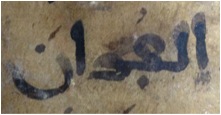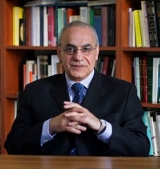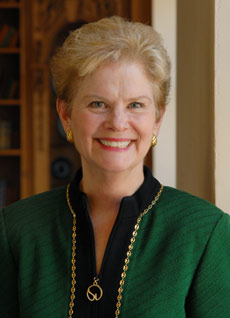How do you distinguish fā’ from qāf in early Qur’ān manuscripts?
By Keith Small
IQSA is providing a significant platform for the exploration of paleographic and orthographic features in early Qur’ān manuscripts. Recent blogs by Alba Fedeli and Daniel Brubaker have provided windows into some of the cutting edge research in Qur’ān manuscript studies. At the recent joint SBL/IQSA track at the SBL International meeting in St. Andrews, Scotland we had a fascinating lecture by Prof. Alain George on the Mingana Palimpsest at Cambridge. I’d like to give my own brief contribution with this blog using a recent discovery made while engaged in some routine library work.
Recently, while down in the bowels of the Bodleian, avoiding Oxford’s recent heatwave and working on the catalogue of the Qur’ān manuscripts for Oxford University, curator Alasdair Watson and I observed the following spelling of the word Qur’ān in Surah Tā Hā, 20:2, in Bodleian Ms. Arab.e.179, f. 65r, l. 7:
There is a well known convention that in Maghribi Qur’ān manuscripts and in modern printed Warsh Qur’ans where qāf is designated with one dot above the letter, but where can one find examples of one dot below?
Frederick Leemhuis observes that in the first Islamic century this was a convention used in a few manuscripts from the Hijaz and Yemen and even in the Dome of the Rock Inscriptions.[1] Leemhuis noted four manuscripts in which he had observed this rare system: Saray, Medina 1a, in Istanbul; 01-29.2 in Ṣanʽā’; E-20 in St. Petersburg, and Cod. Mixt. 917 in Vienna. I also observed this system in the manuscript from Ṣanʽā’, 01-29.1.[2] Now, here it is appearing in manuscript in the Bodleian collection, and quite an unexpected place to find it at that.
Bodleian Ms.Arab.e.179 is an early paper Qur’ān, probably early 10th century, written in a large Eastern Kufic hand, or by its technical name, Déroche’s New Style script, most similar to his NS III classification, and similar in appearance to the 10th century parchment page, KFQ 40, pictured in his The Abbasid Tradition.[3] As a paper Qur’ān, it is a significant find in itself predating most early paper Qur’ans by a century and written in a large older Kufic hand that is a transitional script style into the New Style. Leemhuis states that to his knowledge, the rare system for dotting the qāf below the line was isolated to the Arabian Peninsula. Because of its script style, and because of the use of paper, this manuscript was probably produced much farther north and east in a more Persian sphere of influence. The manuscripts Leemhuis refers to are Hijazi and Kufi manuscripts, all written before the late 8th century CE (01-29.1 is also very early Hijazi). So here we have a bit of a mystery. How did an early orthographic convention which had apparently gone out of use reappear at least a century later and 1000 miles away? Then there is the related question, how and when did the two systems in use in Qur’āns today come to be the accepted conventions for their regions? Also, this one issue of distinguishing fā’s and qāfs is only one of many orthographic decisions that were made in Islam’s first few centuries as Arabic orthography was improved to make it a vehicle able to contain and transmit precise vocalization systems of the Qur’ān. How exactly did these larger orthographic and vocalization systems come to be invented, improved, adopted, transmitted, and ‘canonized’? In 1998, Russian Qur’ān scholar Efim Rezvan observed, [4]
Thus, it is today evident that the real history of the fixation of the Qur’ānic text attested in the early manuscripts differs in extremely serious fashion from the history preserved in the Muslim tradition. Only an analysis of manuscripts will allow us to reconstruct the true history of the canon’s establishment.
In one way, this feature Alasdair and I stumbled upon raises more questions than it answers. In another, it points to the validity of the endeavour of these careful studies on the manuscript tradition. These kinds of features show that scribes worked according to careful rules of orthography and notation, rules and conventions that would extend past barriers of time and geography, conventions that can be traced and examined in retrospect. By examining such details from the manuscripts, we can build up a better and more precise narrative of the textual development of the Qur’an.
When we meet in Baltimore in November, Alasdair and I look forward to sharing more treasures with you from the collection at the Bodleian Library.
[1] Frederick Leemhuis, ‘From Palm Leaves to the Internet’ in Jane Dammen McCauliffe, ed., Cambridge Companion to the Qur’ān, Cambridge, CUP, 2006, 147, 148.
[2] Keith Small, Mapping A New Country: Textual Criticism and Qur’an Manuscripts. PhD thesis, London: Brunel University, 2008, 139; Textual Criticism and Qur’an Manuscripts. Lanham, MD: Lexington Books, 2011, 18-19.
[3] François Déroche, The Abbasid Tradition, London: Nour Foundation, 1992, 136, 137, 140.
[4] Efim A. Rezvan, ‘The Qur’an and Its World: VI, The Emergence of the Canon: the Struggle for Uniformity’, Manuscripta Orientalia 4 (1998), 13-54, here 23.





